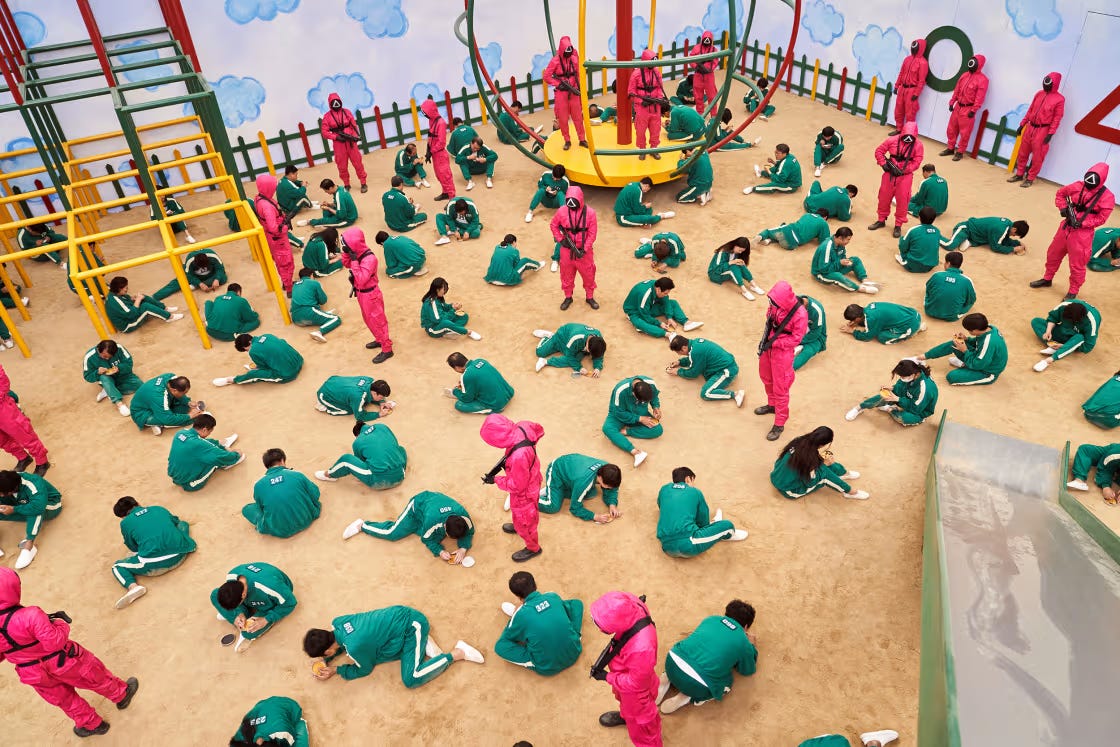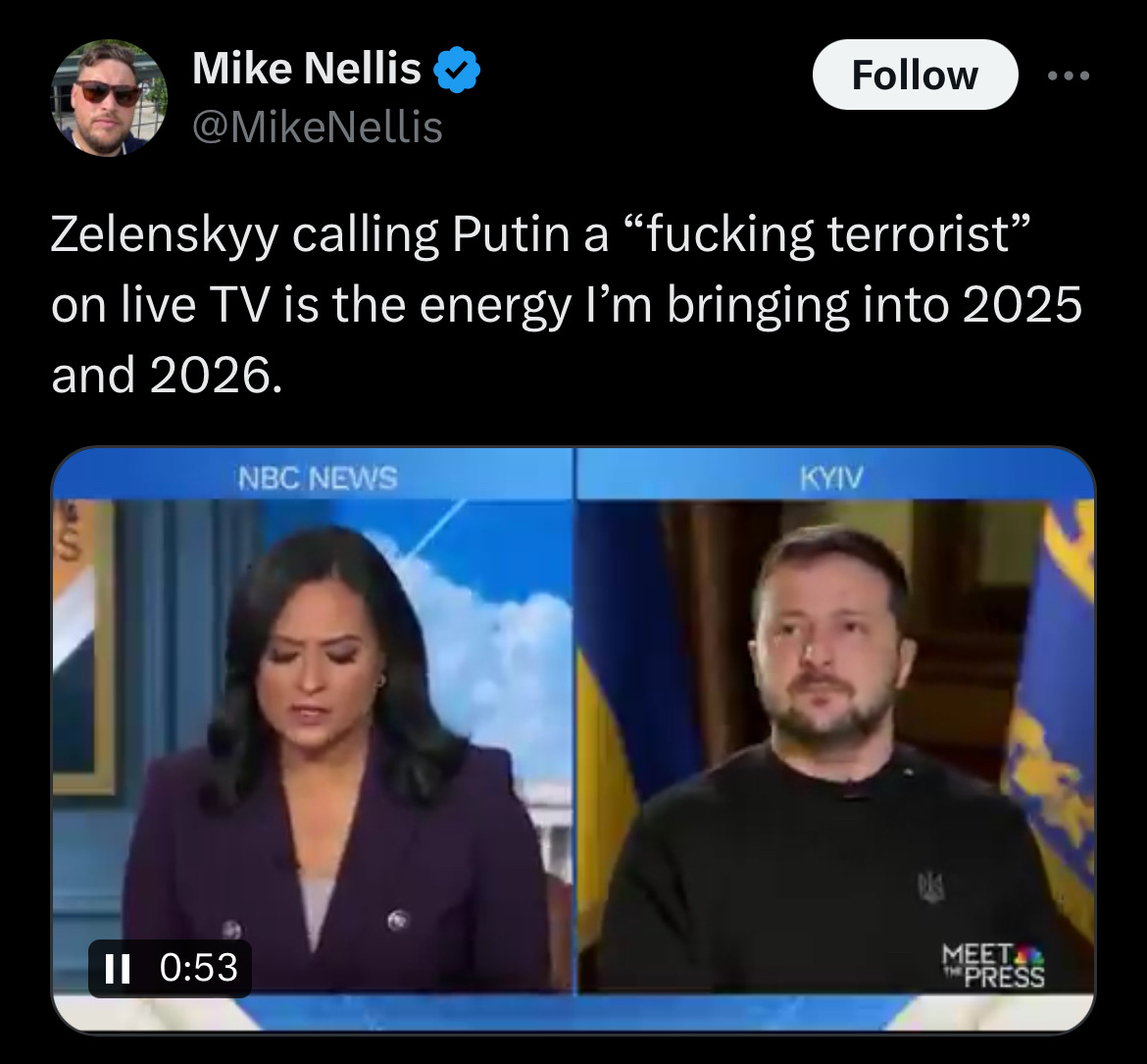What is "masculine energy"?
Mark Zuckerberg wants to make workplaces more "masculine." But we all seem to have different definitions of it.
As most of us know at this point, Mark Zuckerberg went on Joe Rogan’s podcast the other day in a gold chain to proclaim that workplaces are “culturally neutered” and need more “masculine energy” (i.e. aggression, he says).
There have been endless think pieces on this (I’ve opined as well)—but what is most striking to me right now is the vast difference of opinion as to what we constitute as “masculine” and “feminine.” People are so far apart on their definitions of these things that it seems impossible to have a conversation about it. We’re not talking about the same things.
To be clear, I actually like masculinity in various forms. I have always felt myself to be more of a feminine woman—fluid, dreamy, softer, interrogating situations versus having 100% conviction, and quieter in how I interact with things and people. So I enjoy being around people (sometimes), both men and women, who exhibit qualities like absolute certainty, taking action or charge in certain situations, making decisions, and grounded-ness. In a romantic sense I have always been attracted to men who had varying levels of masculinity. Passion, some chivalry, providing, and ambition are all qualities I believe to be masculine, and qualities that I very much enjoy in a man.
At the same time, I think most women have some masculine qualities—as I believe some men have “feminine” qualities, like taking care and nurturing others (which, in another framing can be seen as chivalry, so perhaps even I am confused on the definition!). For me, it’s the pursuit of freedom to experience life on my terms. If I become more aggressive or icy, it is usually when I am restricted from doing what I want to do.
In a conventional workplace sense, I always felt that I was always more respected by men the more masculine I became (and some women, but that’s more complicated). The more of a “shark” I was—compartmentalizing any true feelings I had, or being “certain” about things even though I wasn’t—the more I was promoted, respected, and better-paid. At the same time, I didn’t totally feel like myself. At my core I am not some sort of politically conniving person with certitude. I have always been ambitious with a deep desire to learn and experience the world, but being interpersonally aggressive at work to get my way felt…unsafe. This is contradictory in a way, because hypothetically, this trait that was meant to protect me economically and professionally. But it also made me feel unwell in my body, inauthentic. I wanted to peel my skin off, I felt ossified and hardened. I missed being soft and silly.
I interviewed a former Meta employee about what he makes of “masculinity” (subscribe to my YouTube here for the full interview!) He said that he defines it as being a “provider” for his family. Meanwhile, a commenter on my YouTube said that his definition of masculinity is the unhindered ability for a man to tell a woman in the workplace that she is “beautiful,” or that she has “heart-shaped hips” without being fired. (lol)
What I really think Mark Zuckerberg is talking about when he says “masculinity” is neither of those things, actually. It’s not about masculinity or femininity. In my opinion, it is a shift to some sort of Squid Game “survival of the fittest” environment, where we weed out the weak in favor of the strong.
The people who are able to dominate others or form political alliances can hoard things for themselves and accrue more power. Women can become one of the “guys” to compete with them and/or (more likely) abet them. The other alternatives are to receive protection from one, or be cast out. We are in a ruthless competition for resources, as if we’re in a video game, the Coliseum, or yes…a UFC competition. It’s an inherently violent viewpoint, and while violence cannot be ignored as part of our humanity, to make it most of our humanity would be to devolve significantly, fanning the flames of rage and scrambling as if everything were scarce.
Ironically, many of the disillusioned men and incels who claim that they’re going to return to some form of hyper-masculine triumph are the ones who may be failing economically and romantically, and not winning this modern Squid Game. It’s why people like Pete Hegseth are appointed as Secretary of Defense. He’s actually incompetent for the job, but he projects “manhood” (i.e. harassing his co-workers and getting drunk at strip clubs). So he can easily be manipulated in his position.
Ideally we’d wrest control of this Zuck “masculinity” narrative, as the Squid Game lifestyle doesn’t really sound all that pleasant to me at any level, whether you are the guards controlling the game and shooting the players, the players getting weeded out, or the voyeurs watching the suffering to scratch the need for sadistic entertainment.
Workplaces are not meant to be a spa or some circle of feelings all the time, of course. But also, heading into the office to expect to attack someone or to be attacked also just sounds like a miserable existence. When the most psychologically insecure pretend to be strong for the sake of “winning” some impermanent and fleeting game—one that they have no idea why they are playing, beyond that it feels fucking great to the ego—it eventually becomes see-through to many of us. And we can opt out.
Anyway. Here are some of my personal favorite forms of masculinity…
Til next time!
xo Ari










I like this take, especially the comments on Zuckerberg, who’s compensating for an (almost painfully) obvious lack of what he professes to support.